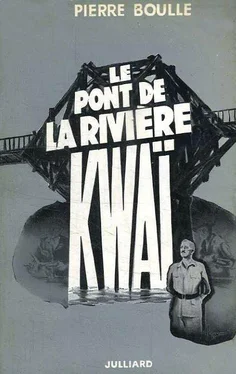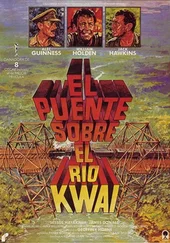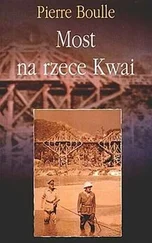The day went by quite quickly. When it was dark he scrambled down the slope, swallowed several mouthfuls of muddy water, filled his bottle, then returned to his hide-out. He allowed himself to doze leaning against a tree, without shifting his position. If, for some extraordinary reason, the train’s schedule were to be changed, he would still be able to hear it in the distance, he felt certain. When one has lived for some time in the jungle, one quickly develops the instinctive wariness of a wild beast.
He slept by fits and starts, punctuated by long bouts of insomnia. In between, visions of his present adventure alternated strangely with memories of that past life of his which he had described to Shears before launching out on the river.
He was once again in the dusty workroom in which some of the best years of his life had been spent sitting day after day for long gloomy hours in front of a sheet of drawing paper under a projector lamp. The girder, that bit of metal which he had never actually seen, was responsible for the mathematical symbols in two dimensions which had occupied the whole of his youth. The plan, the outline, the elevation, and countless cross sections came to life before his very eyes, with all the details of the structure, the expert arrangement of which had enabled him to achieve a saving of a pound and a half of steel after two years of tests and experiments.
Superimposed on this picture, against the background of this structure, were the small brown squares, like those Warden had drawn, fixed to the twenty-four piles on the large-scale plan of the bridge. The heading, over which he had sweated so painfully and so many times, the final heading came into focus, then grew blurred as he watched it. He tried in vain to decipher the letters. They were dotted all over his drawing paper, until at last they fused together again, as sometimes happens at the end of a film on a movie screen, to form a single word. It was the word DESTRUCTION, in heavy black letters written in shiny ink, which reflected the light of the projector lamp and bewilderingly filled the whole screen, leaving no room for any other character.
He was not really obsessed by this sight. He could avoid it whenever he wanted. All he had to do was open his eyes. The dark corner in which the River Kwai bridge stood outlined in black banished these dusty ghosts of the past and summoned him back to reality. His life would no longer be the same after this. He was already tasting the fruits of success while witnessing his own metamorphosis.
At dawn, about the same time as Shears, he, too, felt uneasy on account of the perceptible change in the emanations from the river. The alteration had been so gradual that in his fuddled state he had not even been aware of it. From his hide-out he could see only the platform of the bridge. The river was out of sight, but he was certain his feelings were justified. This certainty soon became so overwhelming that he felt he could no longer remain inactive. He pushed his way through the undergrowth toward the river, reached the last curtain of branches, and looked out. He saw the reason for his uneasiness at the same time that he noticed the electric wire lying exposed on the pebble beach.
Following the same course as Shears, his mind slowly grasped the significance of this irreparable disaster. In the same way he felt his whole body quiver at the thought of the plastic charges. From his new position he would be able to see the piles. He had only to raise his eyes. He forced himself to do so.
It took him a fairly long time to appreciate how much the risk had been increased by the River Kwai’s whimsical behavior. Even after close observation, he could not assess the extent with any degree of accuracy, but oscillated between hope and despair at each of the thousand ripples which the current created around the bridge. At first glance a wave of voluptuous optimism eased his nerves, which were tense with the horror of his original fears. The river had not sunk so very much. The charges were still under water.
At least they seemed to be, from this position rather far down. But from above? From the bridge? And even from here? Concentrating still more closely, he now noticed a fairly large wave, like one created by a flow of water around a grounded wreck, washing round the piles, those piles which he knew so well and which he had left encrusted with strips of his own flesh. The waves round those particular piles were larger than the rest. And on one of them he thought he could see a patch of brown against the lighter color of the wood. This emerged from time to time like a fish’s dorsal fin, yet a moment later there was nothing to be seen but the eddy. The charge was probably just below the surface of the water. A keen sentry would certainly be able to spot those on the outside rows simply by leaning over the parapet.
And what if the level should fall still further? In a moment, perhaps, the charges would be visible for all to see, still dripping with water, sparkling in the harsh light of the Siamese sun! He was numbed by the grotesque absurdity of the picture. What time was it? How long would it take? The sun was just beginning to light up the valley. The train was not due before ten o’clock. Their patience, their toil, their anxiety, their suffering, all had suddenly been rendered pitiful and almost ludicrous by the inhuman whim of this trickle from the mountains. The success of the big attack, for which he had for good and all sacrificed his hitherto neglected reserves of stamina and strength after thriftily saving them up for years, was now again in the balance, being weighed once more on scales which took no heed of his soul’s ambition. His destiny was to be fulfilled during the minutes that remained before the train’s arrival, fulfilled regardless of himself, fulfilled on a higher plane; consciously fulfilled, perhaps, but in an external consciousness, a pitiful consciousness scornful of the impulse which had carried him thus far, a consciousness which directed human affairs at such a high level that no human wish could sway it, neither entreaty nor despair.
This feeling that the discovery or non-discovery of the explosive was now independent of anything he could do made him, paradoxically enough, a little calmer. He stopped hoping. He could not afford to waste an ounce of energy on things that were taking place on a supernatural plane. He had to forget about them, so as to concentrate all his resources on the factors which were still within the scope of his own initiative. It was on these, and these alone, that he now had to bring his mind to bear. The operation was still feasible; he only had to envisage what form it was likely to take. He was still wondering what his reactions would be. Shears had noticed him doing that before.
If the charges were discovered, the train would be stopped before it reached the bridge. He would then thrust the plunger down before being discovered himself. The damage would be easily repaired. It would be only a partial success, but he could not help that.
It was a different situation when it came to the electric wire. This could be seen by anyone walking along the beach a few feet away from him. In that case there was still a chance of taking independent action. Perhaps there would be no one on the bridge at that moment, and no one on the opposite bank who could see him. And the slope hid the pebble beach from the Japanese in the camp. The man would probably hesitate before sounding the alarm. In that case he, Joyce, would have to act, and act fast. And to do that, he would have to keep both bridge and beach in view.
He thought again, returned to his previous hide-out, and brought his gear back to his new position behind a flimsy screen of undergrowth from which he could see at the same time the bridge and the patch of open ground now bisected by the wire. An idea crossed his mind. He took off his shirt and shorts. He kept on his pants. This was more or less like the prisoners’ working gear. From a long way off he might be mistaken for one of them. He carefully set up the generator and knelt down beside it. He took his knife out of his sheath. This important item of equipment, which was included on every Plastic and Destructions Company expedition, he placed on the grass by his side. Then he waited.
Читать дальше











